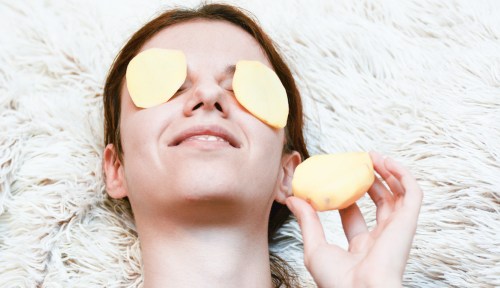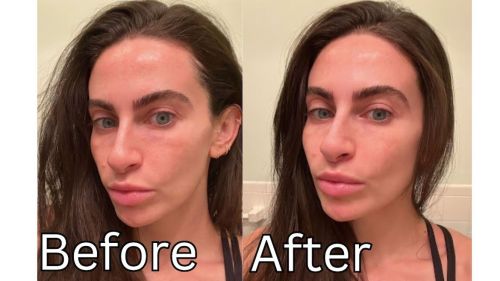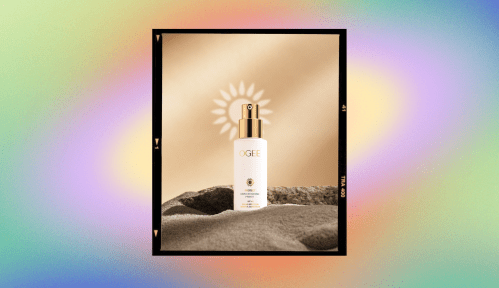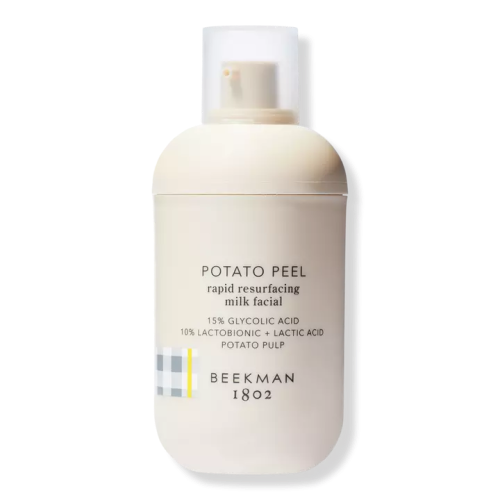Our editors independently select these products. Making a purchase through our links may earn Well+Good a commission
Why Dermatologists Say Potatoes (Yes, Potatoes!) Might Just Be the Secret to Brighter Skin
With the launch of Beekman 1802's Potato Peel, dermatologists explain the brightening benefits of potato for skin.

There are about a million and one ways to use potatoes. You can boil them, mash them, fry them, and—if TikTok is to be believed—rub them on your face for the sake of brightening your skin.
The multi-purpose starch has been seeing traction on the app from DIY-ers who have been rubbing potato pulp onto their faces (an age-old Ayurvedic practice) for the sake of brightening darkened areas of skin. This ultimately caught the attention of the formulators over at Beekman 1802, who launched a Potato Peel ($49) earlier this month. It is clinically proven to gently resurface the skin, even out skin tone, and leave your skin brighter and smoother after usage.
Beekman 1802, Potato Peel Rapid Resurfacing Milk Facial — $49.00
The benefits of potato for skin
“Potato pulp is basically blended or grated potatoes,” ” explains Dustin Portela DO, FAAD. “It’s an extremely hydrating ingredient because potatoes contain a very high water content. Potato pulp in skin care can help to calm inflamed and irritated skin because it contains natural enzymes that help to reduce inflammation.” He adds that potato pulp contains vitamin C, a known brightening agent.
What’s more, potato extract contains abundant starch, as well as vitamin B6, says Krupa Koestline, clean cosmetic chemist and founder of KKT Consultants. “[Potato pulp] is used on sunburned skin for the soothing effect and the high levels of vitamin C that provide skin brightening and anti-oxidant effects,” adds Koestline.
However, because potatoes have such intense brightening abilities, you’re better off using them in a professionally-formulated skin-care product than rubbing them on your face raw. “It is important to note that the potato [pulp] can lighten the skin, reducing dark spots and hyperpigmentation by inhibiting the production of melanin,” says Dr. Portela. So if you want to avoid the “halo effect” on dark spots (which happens when the skin around hyperpigmentation becomes lighter than your natural skin tone), you’ll want to avoid mixing your own potato treatments at home.
Additionally, Dr. Portela warns that DIY potato remedies don’t have preservatives, which makes them susceptible to microbial growth and puts you at risk for irritation, infection, and inconsistent results.
All about the Beekman 1802 Potato Peel
Beekman 1802’s Potato Peel is touted as the first-ever gentle potato peel. It’s formulated with the brand’s signature goat milk, three molecular sizes of acids—glycolic and lactic, which are alpha hydroxy acids (AHAs), and lactobionic acid, which is a polyhydroxy acid (PHA)—and, of course, potato pulp. Though each of these actives serves its own purpose, when combined with potato pulp, they come together to resurface the skin and leave it brighter and more illuminated, says Koestline.
In addition to potato pulp being rich in vitamin C, which normally does not fare well in facial peels, the properties of potato pulp allow it to be formulated into the Potato Peel without it causing irritation. “You usually can’t mix vitamin C in high acid peel formulas because it oxidizes the formula and irritates skin,” says Ayesha Bshero, head of product development at Beekman 1802. “But potato pulp provides a brightening effect to the formula without destabilizing it. Because of the potato pulp and goat milk in the formula, it helps maintain a healthy and slightly acidic pH of 4 and the peel itself doesn’t need to be neutralized after applying.”
Dr. Portela notes that goat milk—which contains skin-loving vitamins, minerals, fatty acids, and proteins—is highly moisturizing and mimics our skin’s natural pH levels, which is what makes the Potato Peel tolerable for sensitive skin. “Vitamins A and D [in goat milk] help to repair damaged skin, reduce the appearance of lines and wrinkles and help skin to retain moisture,” he says, adding that the prebiotic property of goat milk also helps to support the microbiome of the skin. “Additionally, milk contains lactic acid which aids in removing dead skin cells and cell turnover.”
Additionally, the acids play their own special role in the formula. “Lactic and lactobionic acids are milk acids that gently exfoliate while soothing skin due to their larger molecular size and natural humectant properties, and glycolic acid is a powerful AHA with a smaller molecular size that provides a deeper resurfacing effect for skin,” says Bshero. “All three of these work as chemical exfoliants and help skin turnover, which helps improve the look of dark spots and makes the skin brighter,” adds Koestline. As far as how to use the peel goes, “If dark spots and hyperpigmentation are issues or you like the other benefits it provides—like hydration and exfoliation—I recommend using exfoliating products like the Potato Peel two to three times per week as a complementary treatment to your existing regimen. It should not replace your daily routine,“ says Dr. Portela. Bshero adds that the peel should be used in the evening after using a gentle cleanser, and avoid any serums or actives post-peel.
What happened when I tried the Beekman 1802 Potato Peel

After learning so much about potato pulp, I was eager to try out the product on my sensitive skin.
In addition to having a nice, almost calming scent to it, the peel was very easy to use. I put a thin layer of the brownish-clear gel all over my face, neck, and back of my hands (Pro tip: Don’t forget the backs of your hands when doing skin-care treatments!) and let it sit for 20 minutes.
There wasn’t any discomfort to speak of while the peel worked its magic, and after washing it off, my skin looked noticeably brighter, slightly smoother, and just a tad tighter. While I am impressed with the results after using it once, I assume that after regular use, 2-3 times a week, I will see even more noticeable results.
I love having happy and calm skin after using a multi-acid peel, and potato now holds a special place in my weekly skin-care rotation.
Sign up for the Well+Good SHOP Newsletter
Get exclusive deals on wellness, beauty, fitness, and food products that have been hand-picked by our editors.
Got it, you've been added to our email list.








